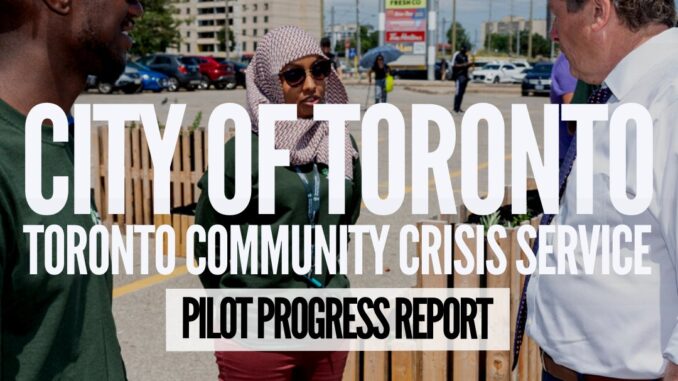
This week, Toronto City Council received a progress report on the recently implemented Toronto Community Crisis Service (TCCS) pilots.
Preliminary program data demonstrates that the Toronto Community Crisis Service is successfully diverting persons in crisis calls from a police response to a community-based response, connecting those in crisis to appropriate community-based services, completing follow-ups and supporting clients who need ongoing case management.
Along with our partners we are making great progress in strengthening our response to those in a mental health crisis. pic.twitter.com/ShHwizuz1P
— John Tory (@TorontosMayor) July 22, 2022
TCCS has launched in four areas of the city, and implementation has taken a phased approach to ensure service delivery is efficient, consistent and reliable. This approach has also ensured that each pilot can adapt to local service conditions and emerging opportunities. Service pilots in the city’s downtown east and northeast areas launched in the spring. The report provides early program data and analysis from the two initial pilots from March 31 to June 18, 2022.
A high-level summary of some key program data can be found below:
• The Toronto Community Crisis Service received a total of 549 calls for service from 9-1-1, 2-1-1 and directly to the anchor partners. Of total calls received, 80 per cent were dispatched to the mobile teams.
• Ten per cent of calls from all sources were handled on the phone, with the client being given information or referrals.
• The most common 9-1-1 call type transferred to the pilots was a person in crisis calls (36 per cent); wellbeing check (33 per cent); and distressing or disorderly behaviour (20 per cent).
• Of the 80 per cent of calls that were dispatched, 61 per cent supported clients successfully, 25 per cent were unable to locate the client; 9 per cent were declined by the client and 5 per cent were no longer needed.
• Crisis teams completed 340 post-crisis follow-ups with clients within the 48-hour service standard and successfully offered 157 referrals to clients.
• In the vast majority of cases, the mobile teams did not identify a need to involve other emergency services. The TCCS made requests for police attendance on 2 per cent of all calls attended and requested ambulance attendance on 3 per cent of all calls attended.
While additional time is needed to effectively assess the pilots’ performance and impact, the data demonstrates that the pilots are succeeding in advancing key outcomes. The City of Toronto will continue to support pilot implementation with a focus on ongoing oversight and consistent service delivery across pilot areas. The next two pilots, in the downtown west and the northwest, launched on July 11 and 18, 2022.
A comprehensive evaluation report on the pilots will be brought to Council in October 2023.In the interim, staff will continue to collect data over the course of the pilot phase and use emerging data from the evaluation to inform service delivery and adjustments to the pilots to ensure operational efficiency and service excellence.
The Toronto Community Crisis Service pilot is one of SafeTO’s first-year priority actions focused on reducing vulnerability in Toronto through proactive mental health support strategies and community-based crisis support models.
A high-level summary of the key program data can be found in this infographic:
https://www.toronto.ca/legdocs
The final report to Council is available on the City’s website:
http://app.toronto.ca/tmmis/vi
Quotes:
“We are continuing as a City to make progress strengthening how we respond to those in mental health crisis. In introducing the Toronto Community Crisis Service, we are advancing mental health care options and working to help more people.”
– Mayor John Tory
“I commend City staff and our community partners for their work on this report, and I am encouraged by the preliminary data presented today. The report’s data shows that we are making significant strides in the way we respond to community crises in our diverse communities.”
– Deputy Mayor Michael Thompson
“We are thrilled that preliminary data confirms that the Toronto Community Crisis Services is off to a strong start, and we are making steady progress diverting mental health crisis calls from the police to more appropriate community-based responses. This is what Torontonians have called for and what City Council expects. As the City continues to build on the tremendous work that is being done by our community partners to provide robust support and care for Torontonians in their time of need, we can more confidently plan for the future of this important service in Toronto.”
– Denise Andrea-Campbell, Executive Director Social Development, Finance & Administration
SOURCE City of Toronto

Leave a Reply